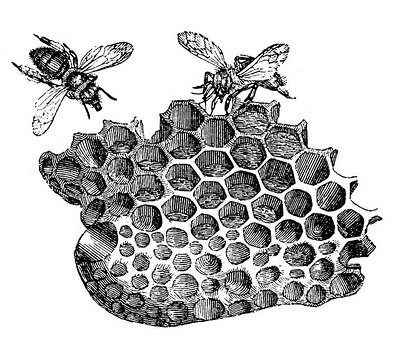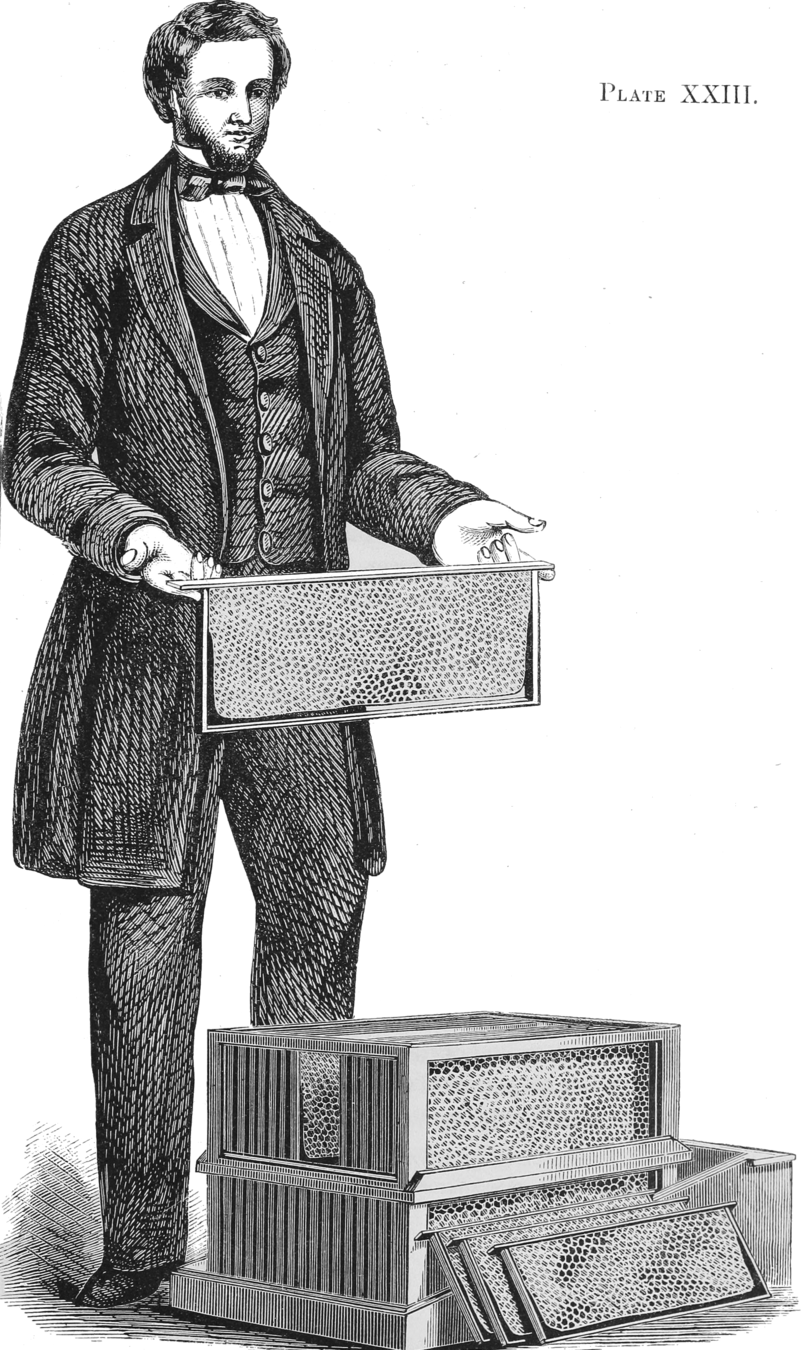Honeycomb Geometry
Rigid Motions on the Hexagonal Grid

The figure comes from "Insects The Yearbook of Agriculture 1952" United States Dept. of Agriculture." Published by the US Government Printing Office. Deemed to be in the Public Domain under US Law.
by Kacper Pluta, Pascal Romon, Yukiko Kenmochi and Nicolas Passat
Motivations
We came to agree with Nouvel & Rémila that digitized rigid motions defined on the square grid are burdened with a fundamental incompatibility between rotations and the geometry of the grid.
Agenda
-
Introduction to the Bees' Point of View
-
Quick Introduction to Rigid Motions
- Neighborhood Motion Maps
- Contributions
- Conclusions & Perspectives
The beehive figure's source and author unknown (if you recognize it, please let me know). The image of the bee comes from http://karenswhimsy.com/public-domain-images (public domain)





Introduction to the Bees' Point of View
Or why bees are right

The figure comes from http://thegraphicsfairy.com/vintage-clip-art-bees-with-honeycomb
Square grid
+ Memory addressing
+ Sampling is easy to define
Hexagonal grid
+ Uniform connectivity
+ Equidistant neighbors
+ Sampling is optimal
- Sampling is not optimal (ask bees)
- Neighbors are not equidistant
- Connectivity paradox
- Memory addressing is not trivial
- Sampling is difficult to define
Pros and Cons
Square grid
+ Memory addressing
+ Sampling is easy to define
Hexagonal grid
+ Uniform connectivity
+ Equidistant neighbors
+ Sampling is optimal
~ Memory addressing is not trivial
~ Sampling is difficult to define
Pros and Cons

The figure by Pearson Scott Foresman, Wikimedia.
Howdy vision lads and gals! These problems seem to be somehow solved.
- Sampling is not optimal (ask bees)
- Neighbors are not equidistant
~ Connectivity paradox
Square grid
+ Memory addressing
+ Sampling is easy to define
Hexagonal grid
+ Uniform connectivity
+ Equidistant neighbors
+ Sampling is optimal
~ Memory addressing is not trivial
~ Sampling is difficult to define
Pros and Cons

The figure by Pearson Scott Foresman, Wikimedia.
You may think: "Hold your horses! It’s not a bug, it’s a feature..."
- Sampling is not optimal (ask bees)
- Neighbors are not equidistant
~ Connectivity paradox
Hexagonal Grid



The hexagonal lattice:
and the hexagonal grid
Digitization Model

The digitization operator is defined as a function
such that
and
Digitization Model
This is a definition for digital geometers not for computer vision guys...


The digitization operator is defined as a function
such that
and
How many digital balls do you see?




The figure of bumble bee comes from http://www.ase.org.uk (public domain)
Quick Lesson on Rigid Motions
Or how to become a beekeeper. Part I - Equipment

The figure comes from Wikimedia. Original source The New Student's Reference Work (public domain)
Rigid Motions on
Properties
-
Isometry map - distance preserving map
-
Bijective
Properties
- Non-injective


- Non-surjective
- Do not preserve distances
Rigid Motions on
Related Studies
- Nouvel, B., Rémila, E.: On colorations induced by discrete rotations. In: DGCI, Proceedings. Volume 2886 of Lecture Notes in Computer Science., Springer (2003) 174–183
- Pluta, K., Romon, P., Kenmochi, Y., Passat, N.: Bijective digitized rigid motions on subsets of the plane. Journal of Mathematical Imaging and Vision (2017)
Contributions in Short
- Extension of the former framework to the hexagonal grid
- Comparison of the loss of information between the hexagonal and square grids
- Complete set of neighborhood motion maps
- Source code of a tool to study digitized rigid motions on the hexagonal grid
Pure extracted honey
Neighborhood Motion Maps
Or a manual of instructions in apiculture

The figure comes from Wikimedia. The original source The honey bee: a manual of instruction in apiculture (public domain)





Neighborhood

The neighborhood of
(of squared radius
)
Neighborhood Motion Maps
The neighborhood motion map of
with respect to
and
is the function


Remainder Map step-by-step


Remainder Map step-by-step


Remainder Map step-by-step


Without loss of generality,
is an origin, then
Remainder Map step-by-step


Remainder map defined as
where the range
is called the remainder range.
Remainder Map step-by-step



Critical cases can be observed via the relative positions of
that is to say
which are formulated by the translation
Remainder Map and Critical Rigid Motions
Remainder Map and Critical Rigid Motions

Frames
Each region bounded by critical lines is called a frame.


Frames
Each region bounded by critical lines is called a frame.
For any
if and only if
and
are in the same frame.
Proposition
Remainder Range Partitioning






Contributions
Or extracting the pure, organic honey

The figure comes from Wikimedia. The original comes from A practical treatise on the hive and honey-bee (public domain)


For what kind of parameters has the mapping a finite number of images?
Rational Rotations
Rational Rotations


If
and
where
and
Corollary
then the mapping has a finite number of images.
Non-injective Digitized Rigid Motions

Loss of Information

Conclusions & Perspectives
- An extension of a framework to study digitized rigid motions
- Characterization of rational rotations
- We have showed that the loss of information is relatively lower for digitized rigid motions defined on the hexagonal grid
- Our tools on BSD-3 license: https://github.com/copyme/NeighborhoodMotionMapsTools
The humble bees have been working with David Cœurjolly, Tristan Roussillon and Victor Ostromoukhov of University Lyon 1, LIRIS on some new exciting results. Stay tuned...
Homework

If you want to get into the honey business, then this book is an obligatory lecture: Middleton, Lee, and Jayanthi Sivaswamy. Hexagonal image processing: A practical approach. Springer Science & Business Media, 2006.
Honeycomb Geometry: Rigid Motions on the Hexagonal Grid
By Kacper Pluta
Honeycomb Geometry: Rigid Motions on the Hexagonal Grid
Presentation of a paper under the same name. The presentation was created for some internal proposes.
- 2,439



